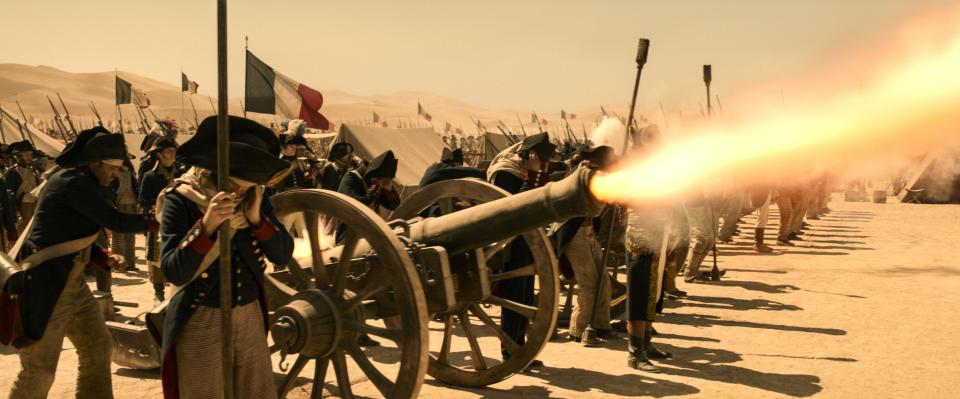Historians absolutely hate Ridley Scott's Napoleon movie

Historians are picking holes in Ridley Scott's "Napoleon."
It features fabrications including showing him shooting at pyramids and leading a cavalry.
In response to criticism, Scott told his critics to "get a life."
Historians seem to be absolutely livid with Ridley Scott's Napoleon movie.
The biopic, which stars Joaquin Phoenix as the French soldier turned emperor, features depictions of some of the most famous European battles in history.
"It ain't a documentary, we know that much! But it's going to be a brilliant piece of art," Dan Snow, a historian and television presenter, said in a 5-minute TikTok post.
"Of the 2 hours 38 minutes, I'd say 38 minutes" of the movie were accurate, military historian Andrew Roberts told Sky News.
Snow and Roberts are two of many historians who have picked apart Scott's loose interpretation of the French emperor's life.
Scott, in response, has been unapologetic. Asked by The New Yorker about Snow's TikTok post, Scott said: "Get a life."
Historians have said that many scenes in the movie never happened.
One scene, showing Napoleon shooting at the Egyptian pyramids, has drawn particular ire among academics.
"Napoleon didn't shoot at the pyramids, and the battle of the pyramids, so-called, was not fought at the base of the pyramids," said Snow.
"But, you know, it looks good!" he said.
Joan Tumblety, an associate professor of French history at the University of Southampton, was more critical of the scene.
In a post in The Conversation, she said: "You don't need to invent ice traps or Napoleon ordering his men to fire at the pyramids, as Ridley Scott's biopic does, to convey his callous disregard for life."

Scholars also raised questions about Scott's choice of Vanessa Kirby, who is 14 years younger than her counterpart Joaquin Phoenix, to portray Napoleon's wife Josephine.
This casting caused "a ripple of surprise among historians" because Josephine was six years Napoleon's elder, Katherine Astbury, Professor of French at the University of Warwick, told The Conversation.

Snow flagged that Napoleon never bravely charged at the head of a disorganized cavalry, did not attend the execution of Marie Antoinette, and did not have humble beginnings.
"He did not come from nothing. His dad was in fact an aristocrat," said Snow.
"Ridley Scott's film does not represent the past so much as carry versions of the tales and images depicting Napoleon that have spun him into existence since his own lifetime – many of which were crafted by his own hand," said Tumbledy.
Asked about historians critiquing his movie's historical accuracy, Scott told the BBC: "You really want me to answer that?... it will have a bleep in it."
Scott defended his artistic choice. "It's not a history lesson, by any means," Scott told the BBC.
Scott has also questioned the historian's own understanding of the facts. "How do you know, were you there?" he said in an interview with YouTube channel History Hit.
Not every expert disagreed with Scott's portrayal. Michael Broers, an author of books on Napoleon who attended script meetings for Scott's biopic, told Time he "had to kind of play fast and loose with chronology, but it made it much easier for viewers to follow."
"And obviously the shooting off the top of the pyramid. Nothing like that happened. But it was quite funny," said Broers.
Read the original article on Insider
